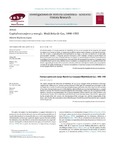Mostrar o rexistro simple do ítem
Capital extranjero y energía: Madrileña de Gas, 1846-1935
| dc.contributor.author | Martínez-López, Alberte | |
| dc.date.accessioned | 2020-03-27T10:36:09Z | |
| dc.date.available | 2020-03-27T10:36:09Z | |
| dc.date.issued | 2020-02 | |
| dc.identifier.citation | Martínez-López, A. (2020). Capital extranjero y energía: Madrileña de Gas, 1846-1935. Investigaciones de Historia Económica, 16(1). 1-11, https://doi.org/10.1016/j.ihe.2018.04.002 | es_ES |
| dc.identifier.issn | 1698-6989 | |
| dc.identifier.uri | http://hdl.handle.net/2183/25257 | |
| dc.description.abstract | [Resumo] El artículo analiza el comportamiento de Madrileña de Gas como ejemplo de la actuación del capital extranjero en el sector servicios. Se ponen de manifiesto varios rasgos comunes a este tipo de inversiones. Por un lado, la especialización sectorial francesa en el gas, y por otro, su interés en los mercados de las grandes ciudades. El respaldo bancario extranjero (Crédit Mobilier) permite el acceso fluido a la financiación parisina en una actividad intensiva en capital. La conexión francesa facilita la transferencia tecnológica y la gestión de las instalaciones. Durante la fase del monopolio la empresa se expande, tanto en Madrid como en provincias, y obtiene buenos resultados. La competencia eléctrica significa el inicio del declive, agravado por el peso del servicio de la deuda, el deterioro del tipo de cambio y la renegociación a la baja de las tarifas. Finalmente, el contexto nacionalista de la primera posguerra mundial propicia su venta a grupos eléctricos españoles. | es_ES |
| dc.description.abstract | [Abstract] The article analyses the behaviour of Madrilena de Gas as an example of the performance of foreign capital in the utilities sector. Several common features of this type of investment are presented. On the one hand, there was the French sectoral specialisation in gas, and on the other, their interest in themarkets of big cities. Foreign bank support (Crédit Mobilier) allowed fluid access to Parisian financing in a capital intensive activity. The French connection helped in the technology transfer and the management of the facilities. During the monopoly phase, the company expanded, both in Madrid and in the provinces, and obtained good results. The competition with electricity meant the beginning of the decline, aggravated by the weight of the debt service, the deterioration of the exchange rate, and the renegotiation of the lower rates. Finally, the nationalist context of the first post-World War period favoured its sale to Spanish electricity groups. | es_ES |
| dc.language.iso | spa | es_ES |
| dc.publisher | Aosociación Española de Historia Económica | es_ES |
| dc.relation.uri | https://doi.org/10.1016/j.ihe.2018.04.002 | es_ES |
| dc.rights | Atribución-NoComercial-SinDerivadas 4.0 Internacional | es_ES |
| dc.rights.uri | http://creativecommons.org/licenses/by-nc-nd/4.0/ | * |
| dc.subject | Madrid | es_ES |
| dc.subject | Capital extrajero | es_ES |
| dc.subject | Energía | es_ES |
| dc.subject | Gas | es_ES |
| dc.subject | Foreign capital | es_ES |
| dc.subject | Energy | es_ES |
| dc.title | Capital extranjero y energía: Madrileña de Gas, 1846-1935 | es_ES |
| dc.type | info:eu-repo/semantics/article | es_ES |
| dc.rights.access | info:eu-repo/semantics/openAccess | es_ES |
| UDC.journalTitle | Investigaciones de Historia Económica | es_ES |
| UDC.volume | 16 | es_ES |
| UDC.issue | 1 | es_ES |
| UDC.startPage | 1 | es_ES |
| UDC.endPage | 11 | es_ES |
| dc.identifier.doi | 10.1016/j.ihe.2018.04.002 |
Ficheiros no ítem
Este ítem aparece na(s) seguinte(s) colección(s)
-
GI-GEHE - Artigos [118]






